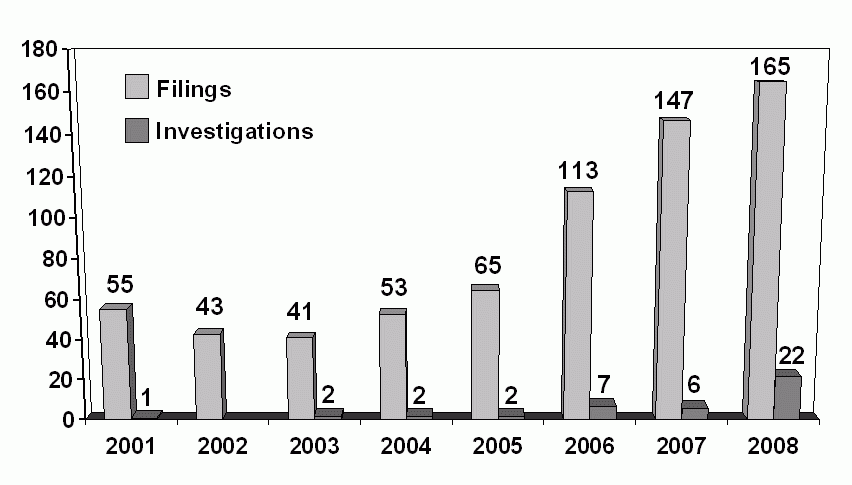FDI Perspective No. 2
The New National Security Review Process for Foreign Direct Investment in the United States
Columbia FDI Perspective No. 2
Columbia FDI Perspective No. 2
Media Contact: Erin St. John Kelly, 212-854-1787, [email protected]
Public Affairs Office, 212-854-2650, [email protected]
NEW YORK, January 7, 2009 —The Vale Columbia Center on Sustainable International Investment has released its second Columbia FDI Perspective, “The Revised National Security Review Process for FDI in the U.S.” Mark E. Plotkin and David N. Fagan of the law firm Covington and Burling LLP explain the new regulations governing the U.S. government’s national security review process for foreign mergers and acquisitions of U.S. businesses, which became effective December 22, 2008.
The new regulations are the ultimate step in a lengthy effort to revise and strengthen the reviews undertaken by CFIUS.
“More and more countries are reviewing their approach toward foreign direct investment,” said Karl P. Sauvant, executive director of the Vale Columbia Center on Sustainable International Investment. “It may well be that the approach taken by the United States, as described by Mark Plotkin and David Fagan, will become a model for these countries.”
Plotkin and Fagan also document the increase in the number of filings by foreign investors to the Committee on Foreign Investment in the United States (“CFIUS”) and the number of investigations.
Source: US Treasury Department
Plotkin and Fagan’s Perspective is available in English and Chinese here: http://vcc.columbia.edu/pubs/#Perspectives
This is the second of an occasional series of perspectives on topical foreign direct investment (FDI) issues the Center produces as “Columbia FDI Perspectives,” Editor-in-Chief, Karl P. Sauvant ([email protected]); Editor, Lisa Sachs ([email protected]).
The first FDI Perspective, “The FDI Recession has Begun,” was issued November 22, 2008.
Vale Columbia Center on Sustainable International Investment (VCC), led by Dr. Karl P. Sauvant, is a joint center of Columbia Law School and The Earth Institute at Columbia University. It seeks to be a leader on issues related to foreign direct investment (FDI) in the global economy. VCC focuses on the analysis and teaching of the implications of FDI for public policy and international investment law.
The Earth Institute at Columbia University is the world’s leading academic center confronting the practical challenges of sustainable development. Based on interdisciplinary research and education, The Earth Institute is dedicated to finding effective solutions to humanity’s most urgent challenges, including climate change, sustainable energy, environmental
degradation, extreme poverty and natural and human-made hazards, among many others.
Columbia Law School, founded in 1858, stands at the forefront of legal education and of the law in a global society. Columbia Law School joins traditional strengths in international and comparative law, constitutional law, administrative law, business law and human rights law with pioneering work in the areas of intellectual property, digital technology, sexuality and gender, criminal and environmental law.
Public Affairs Office, 212-854-2650, [email protected]
NEW YORK, January 7, 2009 —The Vale Columbia Center on Sustainable International Investment has released its second Columbia FDI Perspective, “The Revised National Security Review Process for FDI in the U.S.” Mark E. Plotkin and David N. Fagan of the law firm Covington and Burling LLP explain the new regulations governing the U.S. government’s national security review process for foreign mergers and acquisitions of U.S. businesses, which became effective December 22, 2008.
The new regulations are the ultimate step in a lengthy effort to revise and strengthen the reviews undertaken by CFIUS.
“More and more countries are reviewing their approach toward foreign direct investment,” said Karl P. Sauvant, executive director of the Vale Columbia Center on Sustainable International Investment. “It may well be that the approach taken by the United States, as described by Mark Plotkin and David Fagan, will become a model for these countries.”
Plotkin and Fagan also document the increase in the number of filings by foreign investors to the Committee on Foreign Investment in the United States (“CFIUS”) and the number of investigations.
Source: US Treasury Department
Plotkin and Fagan’s Perspective is available in English and Chinese here: http://vcc.columbia.edu/pubs/#Perspectives
This is the second of an occasional series of perspectives on topical foreign direct investment (FDI) issues the Center produces as “Columbia FDI Perspectives,” Editor-in-Chief, Karl P. Sauvant ([email protected]); Editor, Lisa Sachs ([email protected]).
The first FDI Perspective, “The FDI Recession has Begun,” was issued November 22, 2008.
Vale Columbia Center on Sustainable International Investment (VCC), led by Dr. Karl P. Sauvant, is a joint center of Columbia Law School and The Earth Institute at Columbia University. It seeks to be a leader on issues related to foreign direct investment (FDI) in the global economy. VCC focuses on the analysis and teaching of the implications of FDI for public policy and international investment law.
The Earth Institute at Columbia University is the world’s leading academic center confronting the practical challenges of sustainable development. Based on interdisciplinary research and education, The Earth Institute is dedicated to finding effective solutions to humanity’s most urgent challenges, including climate change, sustainable energy, environmental
degradation, extreme poverty and natural and human-made hazards, among many others.
Columbia Law School, founded in 1858, stands at the forefront of legal education and of the law in a global society. Columbia Law School joins traditional strengths in international and comparative law, constitutional law, administrative law, business law and human rights law with pioneering work in the areas of intellectual property, digital technology, sexuality and gender, criminal and environmental law.
